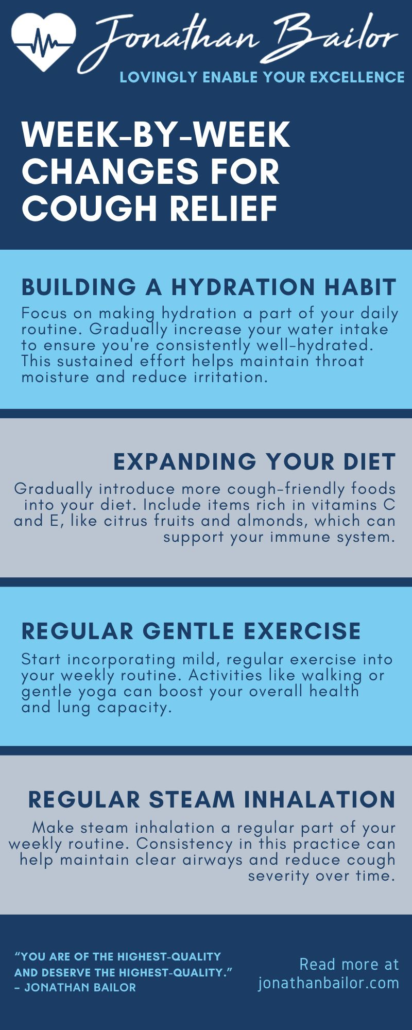21 Breathing Techniques to Soothe Coughing Fits at Every Stage of Life
Jump into 21 breathing techniques to soothe coughing fits at every stage of life with Jonathan Bailor in this cough and phlegm guide! Coughing – it’s not just a simple throat tickle. It’s a chorus we’ve all hummed, especially as we embrace more candles on our birthday cakes. While coughing is a universal experience, the way it affects our lives and the strategies to manage it can be as unique as each of us. And let’s face it; when a coughing fit strikes, it can be more than just a nuisance; it’s like an uninvited guest at the worst possible moment.
More info can be found with our 14 Evidence-Based Home Remedies For Persistent Cough and 23 Breathing and Other Techniques for Easing Coughing Fits guides too!
But here’s some comforting news: there are natural, easy-to-follow breathing techniques and breath control exercises that can help calm those pesky coughing spells. These methods aren’t just plucked from thin air; they are grounded in understanding how our body works and how we can gently nudge it toward comfort, especially when a cough threatens to take center stage.
So, why focus on breathing techniques? Because your breath is a powerful tool. It’s always with you, and it’s free! Plus, it’s a natural way to address coughing without immediately taking medications or treatments. Think of these techniques as your secret weapon against coughing fits—effective, accessible, and tailored for every stage of life.
Let’s clarify one thing: these techniques are not about ‘fixing’ your cough but about managing it in a way that adds to your quality of life. They’re about creating moments of calm amid coughing chaos. And the beauty of it? These strategies are inclusive and designed for anyone who seeks a natural approach to managing their cough, regardless of age or background.
Sharing these techniques is not just about spreading information; it’s about sharing care, comfort, and a sense of empowerment. When you share this with friends and family, you’re offering them more than just tips; you’re offering them a way to better manage their well-being, naturally and gracefully.
So, as you read through these techniques, think of the people in your life who might benefit from this knowledge, and don’t hesitate to pass it on. After all, caring is sharing, and who knows, these simple breath techniques could be the soothing balm someone close to you needs.
Embrace Wellness Now: Immediate Changes to Soothe Coughing Fits
Navigating through the symphony of life, sometimes we hit a note that’s a little off—like an unexpected cough. But fret not! Here are some immediate actions you can take right now to help ease that cough and get back to your melody.
1. Hydration Harmony
The simplest yet often overlooked remedy is water. Start by increasing your water intake. A well-hydrated body helps keep the throat lubricated, making it less irritable and prone to coughing. Think of water as your throat’s soothing agent, working magic with each sip. So, make sure to keep a water bottle nearby and sip throughout the day to reduce the frequency of coughs.
2. Humidify Your Haven
Dry air can be a cough’s best friend. Counter this by using a humidifier in your living space, particularly where you spend most of your time. A humidifier adds moisture to the air, creating a more throat-friendly environment. This little change can make a big difference, especially if you find your cough flaring up in dry, indoor environments.
3. Breath of Fresh Air
Step outside for a few minutes, especially if you’re cooped up indoors. Taking deep breaths of fresh air can do wonders for your respiratory system. It’s a natural way to invigorate your lungs and soothe your throat. Just a brief walk or even standing on your balcony or in your garden can be beneficial. Let nature be your healer!
4. Mindful Breathing
When a coughing fit starts, try a simple breathing exercise. Inhale slowly through your nose and exhale through pursed lips as if gently blowing on a cup of hot tea. This controlled pursed lip breathing technique can help relax the throat muscles and reduce the urge to cough. It’s a quick, calming technique that you can do anywhere.
5. Warm Comfort
A warm, caffeine-free drink can provide immediate relief for a troublesome cough. Herbal teas or just warm water with a slice of lemon can be soothing. The warmth helps relax throat muscles and reduce irritation. Plus, it’s a comforting way to pause and care for yourself.
6. Positional Adjustment
Sometimes, just changing your position can help manage a cough. If you’re sitting, try standing or walking around. If you’re lying down, sit up. This simple shift in posture can sometimes alleviate the pressure on your respiratory tract and reduce coughing.
7. Gentle Throat Care
Avoid clearing your throat too harshly. This can irritate the throat lining and worsen your cough. If you feel the urge to clear your throat, do it gently. Think of it as a soft reset for your throat, done with care and mindfulness.
Incorporating these immediate changes into your day can help you manage that sudden cough more effectively. They are small steps, but their impact on your comfort and well-being can be profound. Remember, it’s about creating harmony in your health, one note at a time.

Feeling Better Is Priceless, That's Why We Don't Put A Price On It!
“It’s Like A Free and Medically Valid Version of Noom and Weight Watchers Online”
~ Dr. Doctor Matthew Oleshiak, MD
Click the 'LEARN MORE' button below for free lifetime access to the fast fix program developed by Jonathan and top Ivy League Medical Doctors
LEARN MOREP.S. It's not a free trial. It's not part of the program for free. The entire program is free, forever, for real! No credit card needed.
Short-term Strategies for Cough Relief: Days to a Better You
A cough can sometimes step on our toes in the dance of life. But fear not, for with just a few short-term changes over the next few days, you can guide your health back into rhythm. Here are some strategies that are as practical as they are effective, helping you navigate through this brief interlude of discomfort.
1. Elevate Your Rest
In the coming days, adjust your sleeping position. If you’re usually a flat-back sleeper, try adding an extra pillow to elevate your head. This slight elevation helps reduce postnasal drip and eases a cough that intensifies at night. It’s a simple tweak to your sleep setup that can lead to a more restful night, letting your body focus on healing.
2. Steam Sessions
Plan to incorporate steam inhalation into your daily routine. Just a few minutes of breathing in warm steam can help loosen the mucus in your throat. You can do this with a hot shower or by breathing in steam from a bowl of hot water. This warmth is not just comforting; it’s a gentle assist to your body’s natural healing process.
3. Herbal Help
Explore herbal teas with ingredients like honey, ginger, or licorice root. These have natural soothing properties and can be a delightful remedy for a stubborn cough. Enjoy a cup of herbal tea a couple of times a day – it’s a warm, comforting ritual that also serves as a natural cough suppressant.
4. Quiet Time for the Throat
Try to speak less and avoid raising your voice. This short-term vocal rest can significantly reduce strain on your throat, giving it a chance to recover. Consider this a time to listen more and let your throat take a well-deserved break.
5. Gargle for Relief
Begin a routine of saltwater gargling. Mix a teaspoon of salt in a glass of warm water and gargle with it a few times a day. This simple solution can help soothe a sore throat and reduce coughing. It’s an age-old remedy, trusted and true, offering relief with just the simplest of ingredients.
These short-term changes are your allies in soothing that cough. Small in effort but significant in impact, they’re about taking those thoughtful steps toward better health, one day at a time. Remember, the little things we do consistently often lead to the most meaningful changes.

Midway to Relief: Week-by-Week Changes for Cough Easing
When navigating the waters of health, a persistent cough can feel like a lingering mist. But with a few strategic changes spread over the weeks, you can clear the air and sail towards calmer seas. Here are some medium-term strategies thoughtfully crafted to bring you incremental yet substantial relief from your cough.
1. Building a Hydration Habit
Over the next few weeks, focus on making hydration a part of your daily routine. Gradually increase your water intake to ensure you’re consistently well-hydrated. This sustained effort helps maintain throat moisture and reduces irritation over time. Think of it as nurturing a plant; consistent watering leads to steady growth and health.
2. Expanding Your Diet
Gradually introduce more cough-friendly foods into your diet. Include items rich in vitamins C and E, like citrus fruits and almonds, which can support your immune system. Also, consider adding more garlic and turmeric, known for their natural anti-inflammatory properties. This gradual dietary shift not only diversifies your meals but also arms your body with nutrients to combat coughing.
3. Regular Gentle Exercise
Start incorporating mild, regular exercise into your weekly routine. Activities like walking or gentle yoga can boost your overall health and lung capacity. These exercises aren’t just about physical fitness; they’re about giving your body the strength and resilience it needs to manage coughing more effectively.
4. Consistent Steam Inhalation
Make steam inhalation a regular part of your weekly routine. Consistency in this practice can help maintain clear airways and reduce cough severity over time. It’s like giving your respiratory system a gentle, warm embrace, offering comfort and relief.
Embracing these medium-term changes can be like planting seeds in a garden. With care, patience, and time, you’ll see the fruits of your efforts in the form of reduced coughing and increased comfort. Remember, it’s the steady steps we take that lead to lasting change.

Long-term Lifelines: Embracing Enduring Changes for Cough Control
As we journey through the seasons of life, addressing a persistent cough requires more than a short-term fix; it calls for nurturing long-term habits. These changes, made over months, aren’t just about quieting the cough but about harmonizing your overall well-being. Here are some enduring strategies to integrate into your lifestyle, each a stepping stone toward lasting respiratory health.
1. Sustained Dietary Focus
Over the coming months, consciously maintain a diet rich in anti-inflammatory and antioxidant-rich foods. Gradually incorporate more leafy greens, berries, nuts, and seeds into your meals. These foods aren’t just palate-pleasers; they’re allies in strengthening your body’s natural defense against irritants that trigger coughing.
2. Regular Aerobic Exercise
Commit to a regular aerobic exercise routine, like swimming or brisk walking. These activities, sustained over months, can significantly improve lung function and overall respiratory health. It’s about finding joy in movement, turning exercise into a rhythm of life rather than a chore.
3. Holistic Health Checks
Make regular health check-ups a priority. Sometimes, a persistent cough can be a sign of underlying issues that need professional attention. These routine checks are your way of tuning into your body’s needs, ensuring everything is working in harmony.
4. Deep Diaphragmatic Breathing and Relaxation Practices
Integrate deep breathing exercises and relaxation techniques, like yoga or tai chi, into your weekly routine. Diaphragmatic breathing, also called belly breathing, sustained over months, can strengthen your respiratory system and reduce the frequency of coughing fits. It’s about embracing calmness, both in breath and in life.
5. Building a Wellness Community
Engage with communities or groups focused on respiratory health. Sharing experiences, tips, and support can be incredibly empowering. It’s about being part of a collective journey where encouragement and advice are always within reach.
These long-term changes are like planting a garden; they require time, patience, and consistent care. But the rewards are bountiful—a life where a cough no longer dictates your melody but instead plays a minor note in your symphony of wellness. Remember, it’s the continuous, thoughtful choices that craft a life of harmony and health.

Coughing & Phlegm FAQs: Understanding and Managing Your Respiratory Health
Navigating the complexities of coughing and phlegm can sometimes feel like deciphering a puzzle. To shed some light on these common concerns, here are answers to frequently asked questions, each crafted to provide clarity and guidance on your path to better respiratory health.
Q1: Why do we cough more at night, and what can be done about it?
Nighttime coughing often intensifies due to the position of our body when lying down. Gravity causes more mucus to pool in the throat, triggering the cough reflex. To alleviate this, try elevating your head with extra pillows. Maintaining a well-humidified room and staying well-hydrated throughout the day can also lessen nighttime coughing. Remember, a good night’s sleep is a pillar of health, and addressing night coughs is a step towards undisturbed rest.
Q2: What does the color of my phlegm indicate about my health?
Phlegm, though not a pleasant topic, is a key indicator of our respiratory health. Clear phlegm is normal and generally signifies a healthy state. Yellow or green phlegm could indicate an infection, such as a cold or bronchitis. If you notice blood in your phlegm or experience persistent color changes, it’s important to seek medical advice. Monitoring phlegm is part of tuning into your body’s signals and guiding you to take action when needed.
Q3: Are there any foods or drinks that can help reduce phlegm production?
Yes, certain dietary choices can help manage phlegm production. Foods high in vitamin C, like oranges and bell peppers, can boost your immune system. Warm liquids, like herbal teas, can soothe the throat and thin the mucus. Reducing dairy intake is advisable, as it can thicken phlegm for some people. Think of your diet as a tool, not just for nourishment but for managing your respiratory health.
Q4: Can allergies cause coughing and phlegm, and how can this be managed?
Absolutely, allergies can trigger a chronic cough and increase phlegm production. This reaction is your body’s way of trying to expel irritants like pollen or dust. Managing allergies often involves avoiding known allergens, using air purifiers, and possibly taking antihistamines. Staying proactive in managing allergies can significantly reduce coughing and phlegm, leading to more comfortable days and nights.
Q5: How can I distinguish between a normal cough and one that requires medical attention?
A normal cough is typically short-lived and often associated with a common cold or mild irritants. However, if your cough persists for more than three weeks, becomes progressively worse, or is accompanied by symptoms like shortness of breath, chest pain, or blood in the phlegm, it’s crucial to seek medical attention. It may be a symptom of a bacterial infection, chronic obstructive pulmonary disease (COPD), severe respiratory infections, whooping cough, gastroesophageal reflux disease (GERD), or other serious conditions. Your cough is a communication from your body; listening and responding appropriately is key to maintaining your health.
In understanding the nuances of coughing and phlegm, you’re taking an active role in managing your respiratory well-being. Remember, your body is an intricate system always speaking to you; learning its language is a step towards a healthier you.
Embracing Wellness: Sharing the Journey
As we conclude our exploration of managing coughing and phlegm, remember that this journey toward respiratory health is not just a personal one. It’s a path we can walk together, with friends and family. Sharing these insights and strategies can be a beacon of support in someone else’s life.
So, I invite you to spread this knowledge through your social media networks and email. Let’s turn these words into actions that resonate within our communities. By doing so, we’re not just sharing information; we’re sharing care, understanding, and a commitment to well-being. Together, let’s breathe easier and live healthier.
Feeling Better Is Priceless, That's Why We Don't Put A Price On It!
“It’s Like A Free and Medically Valid Version of Noom and Weight Watchers Online”
~ Dr. Doctor Matthew Oleshiak, MD
Click the 'LEARN MORE' button below for free lifetime access to the fast fix program developed by Jonathan and top Ivy League Medical Doctors
LEARN MOREP.S. It's not a free trial. It's not part of the program for free. The entire program is free, forever, for real! No credit card needed.




